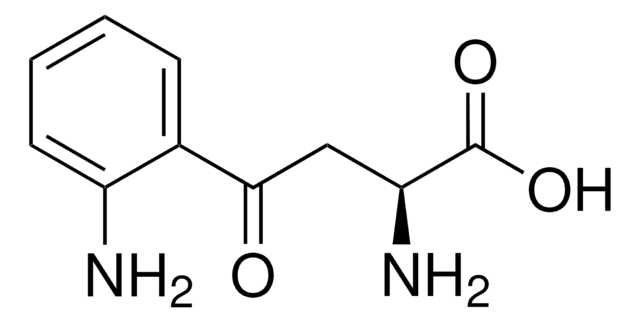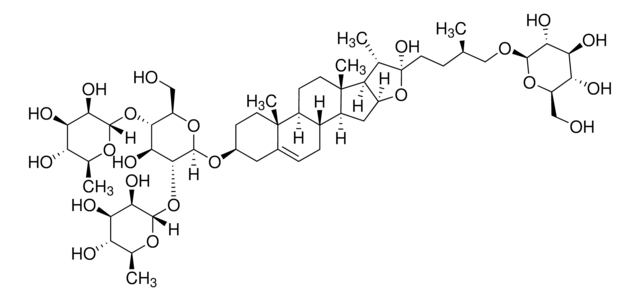79851
Kaempferol 3-β-D-glucopyranoside
≥97.0% (HPLC)
Synonym(s):
3,4′,5,7-Tetrahydroxyflavone 3-glucoside, 3-(β-D-Glucopyranosyloxy)-5,7-dihydroxy-2-(4-methoxyphenyl)-4H-1-benzopyran-4-one, 3-Glucosylkaempferol, Astragalin, Kaempferol 3-glucoside
About This Item
Recommended Products
Quality Level
Assay
≥97.0% (HPLC)
form
crystals
storage temp.
2-8°C
SMILES string
OC[C@H]1O[C@@H](OC2=C(Oc3cc(O)cc(O)c3C2=O)c4ccc(O)cc4)[C@H](O)[C@@H](O)[C@@H]1O
InChI
1S/C21H20O11/c22-7-13-15(26)17(28)18(29)21(31-13)32-20-16(27)14-11(25)5-10(24)6-12(14)30-19(20)8-1-3-9(23)4-2-8/h1-6,13,15,17-18,21-26,28-29H,7H2/t13-,15-,17+,18-,21+/m1/s1
InChI key
JPUKWEQWGBDDQB-QSOFNFLRSA-N
Looking for similar products? Visit Product Comparison Guide
Related Categories
Application
- Role in Ubiquinone Biosynthesis: The compound contributed to the biosynthesis of the benzenoid moiety of ubiquinone, a key component in plant biochemistry, highlighting its essential role in cellular energy production and plant health (Soubeyrand et al., 2018).
Biochem/physiol Actions
Packaging
Storage Class Code
11 - Combustible Solids
WGK
WGK 3
Flash Point(F)
Not applicable
Flash Point(C)
Not applicable
Personal Protective Equipment
Regulatory Listings
Regulatory Listings are mainly provided for chemical products. Only limited information can be provided here for non-chemical products. No entry means none of the components are listed. It is the user’s obligation to ensure the safe and legal use of the product.
JAN Code
79851-VAR:
79851-BULK:
79851-25MG:
Certificates of Analysis (COA)
Search for Certificates of Analysis (COA) by entering the products Lot/Batch Number. Lot and Batch Numbers can be found on a product’s label following the words ‘Lot’ or ‘Batch’.
Already Own This Product?
Find documentation for the products that you have recently purchased in the Document Library.
Customers Also Viewed
Our team of scientists has experience in all areas of research including Life Science, Material Science, Chemical Synthesis, Chromatography, Analytical and many others.
Contact Technical Service
